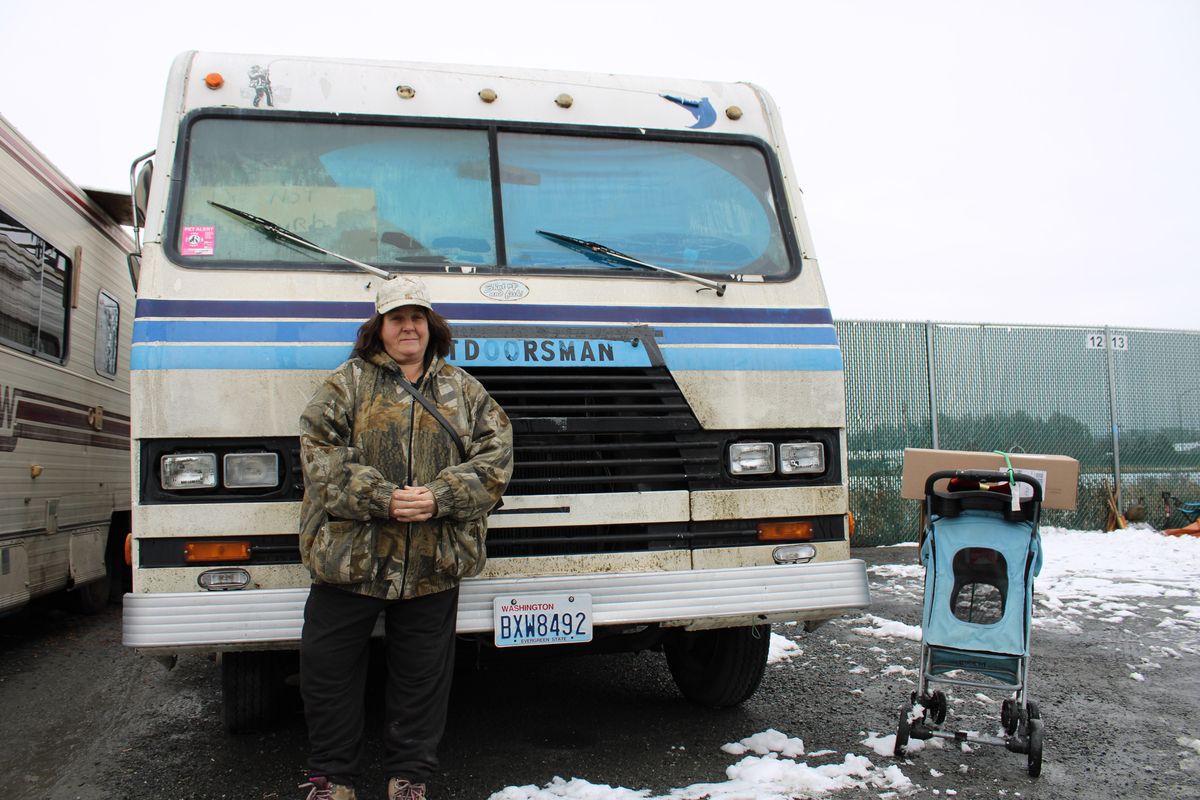‘I don’t really know what’s going on’: Homeless people in Colville address the city’s decision to close down the camp

Tara Benefield, 19, has been living at a Colville homeless camp with her dad since she was 16.
Since her dad retired, she said the pair take on odd jobs when they can, but haven’t been able to find steady work, making the camp a longer-term home than they had hoped.
Up until last week, however, she said she didn’t know city officials were planning to close the camp, saying no one there had been notified about the decision.
“I’m concerned. I’m very concerned with what’s going on,” Benefield said.
Benefield and other residents of the homeless camp said they heard rumors the past few months about the camp in Colville closing, but said neither city council members nor the camp’s facility manager, Pete Ogan, have informed them of what’s happening. Many are unsure where they will go, while others say they’re not surprised by the decision.
Two years ago, Colville reserved a 1-acre lot where homeless people have been allowed to camp so that the city could legally enforce its ordinances against camping on public property and long-term parking. Stevens County loaned the town $125,000 to hire a facility manager and for miscellaneous expenses.
However, Colville officials plan to shutter the city’s homeless camp following a U.S. Supreme Court ruling in July that determined laws preventing the homeless from camping on public property are not cruel and unusual punishment prohibited by the Eighth Amendment. That decision reversed a ruling from a lower court that restricted what local governments could enforce against people camping on public land when no shelter space was available.
The town’s rough timeline is said to start Jan. 1, when it will stop accepting new residents. It will begin moving individuals out in April, by removing those who have been there the longest, and have everybody out by October.
Colville Mayor Jack Smith and Ogan haven’t responded to requests for comment on the decision.
On day last week, Eugene Krager, born and raised in Colville, was sitting at the Hope Street Rest Stop, a different nonprofit that serves homeless people during the daytime. He was reading “Michael Vey: The Traitor,” the ninth in the 10-book series.
While many go to the Rest Stop to get away from the cold and get snacks, he said he goes there often to read to help him stay out of trouble.
Krager has lived in Colville’s homeless camp for almost two years. He’s not sure what’s next.
“I understand that it’s kind of a little inconvenience, but still, I just, I don’t really know what’s going on,” Krager said.
Krager said he never thought he would end up homeless but has been stuck in the camp after losing his job at a freight company.
“You know, I was going to school, and I was still living with my parents and all that stuff. And then when I got out of school, I had a job,” Krager said. “I worked for a freight company for almost 10 years, but they shut down.”
Krager said he’s tried to apply for other jobs in the area, but once he discloses he’s homeless, they don’t give him a chance. He said the lack of transportation in the area has also been an issue since he doesn’t have a car.
Ann Grant has lived at the homeless camp for the past two years as well after losing her home in Illinois.
She, on the other hand, is glad the homeless camp is closing down.
“You know what? People need to get their act together. I don’t do drugs. I don’t drink, you know, and I love helping people,” Grant said. “So, it’s sad that it’s closing down, but it’s also sad that we have slobs.”
She recalled that when she first got to the camp, it wasn’t the “mess” that it has become now, calling it “disgusting,” referring to the shopping carts full of clothes, bikes and other miscellaneous items across the lot, as well as others in the camp who, she said, often spend whatever money they have on drugs.
Grant said she is currently working with a social worker to help her get a place, which she said will take two to three months, and she’s working on finding a job.
Cruze Thompson, housing director for the nonprofit Rural Resources, said they haven’t heard from city officials, other than that the conversation most likely won’t get picked up again until January, and said there likely aren’t exact exit strategies people in the camp can take other than getting on the waitlist for shelters or accepting relocation to another town.
He also said the stereotype people have on homelessness is only because it’s being seen, and many homeless people aren’t on the streets for drugs, saying each person’s situation varies.
“The 20 to 30 people that are seen, may be the stereotype of homelessness, but the other 130 that we’re serving every year are not seen by the general public, and they’re not known about by the public,” Thompson said.
Thompson and Bryan Raines, CEO of the nonprofit, said the homeless population has decreased over the last couple of years.
As Benefield waits to hear more about the situation of the homeless camp, she said she hopes Ogan and the mayor include them in the conversation in the following months.
She also wishes the people there would have gotten more help and feels like “all of this was a joke in the first place.”
“That’s the whole point of being a manager, you know, if that’s his role, or whatever he’s claiming. He should communally make an opinion,” Benefield said.